
This page gives the final analysis of the survey. See the bottom of the page for all for survey data.
The data highlighted three associations – 67% of the students were from the first year, 80% were Asian students, and 60% had never heard of decolonisation.

My aim for this research was to establish ways for students to decolonise the curriculum and to analyse to what extent the art curriculum can be redesigned to incorporate diverse perspectives. The central aspect of the survey highlighted that 60% of the students have yet to hear of decolonisation. The data also highlighted that 80% of the respondents were Asian. The survey indicates very little knowledge of the concept of decolonisation. The main finding of the survey sits within this realm. I will be analysing as to why that is the case. One area I encountered whilst teaching, particularly with some Asian students, was the lack of critical thinking. Leon Moosavi’s 2020 article “Can East Asian Students Think?”: Orientalism, Critical Thinking, and the Decolonial Project state that East Asian students lack critical thinking skills, which echoes this. Also, Walter Mignolo furthers this concept by questioning in the book ‘Can non-Europeans Think’ preface. Mignolo’s disturbance by the question deemed it as an example of “epistemic racism”. Similarly, Kishore Mahbubani asked the question, “Can Asians think?” Mahbubani had a different argument to the posed question – he postulated his opinion on the ‘superiority of Western intellect over Eastern intellect’. He supports his argument that the West has been at the forefront of humanity’s progress and has surpassed all other civilisations in terms of economic progress and geopolitical influence.
Can Asians think? Judging from the record of Asian societies over the past few centuries, the answer should be “no”—or, at best, not very well… Societies that take centuries to wake up cannot be said to think very well. It would be foolish for any Asian to deny this painful historical fact. Mahbubani, K. 2010 (p. 13)
The question ‘Why do East Asian countries like China and Japan lack critical thinking and value mindless repetition in education’ was asked on the Quora platform. The overarching responses by the platform users were for mastery of skills. Examples of these include reciting/playing classical music and ballet to sports. Paulo Freire refers to ‘the ‘Banking’ Concept of Education’ which the students patiently receive, memorise, and repeat”. Freire argues that this teaching and learning method hinders students’ intellectual growth, leading to no critical thinking. Atkinson, D. (1997) argues that critical thinking is a cultural norm inherent in some cultures, suggesting it may not be teachable to those from cultures lacking it. Is this cultural bias? Edward Said deems this to be the “simplistic generalisations about East Asian culture”, emphasising the artificial nature of terms like “Orient” and “Occident.” This distinction can lead to groupings and treatments of East Asian and Western students without recognising their commonalities. A UAL student turned Education Officer and also UAL governorAnita Waithira Israel, states in the UAL Zines on Decolonising the Arts Curriculum co-produced by student and staff (Anita Waithira Israel, Lucy Panesar and Rahul Patel) that she ‘remembers asking questions like why is my curriculum white? Why, what can I do about it? Where can I find out more information about – just find more resources on my heritage’. We have students who want to get involved and question the curriculum but lack diversity, which leaves students from racially minoritised backgrounds feeling too isolated to speak up. Achille Mbembe, 2016 questions ‘whether the university is reformable or whether it is too late’. p.37. The Freedom of Information (FoI) survey in 2020 indicates only 24 out of 104 Universities in the U.K. were committed to decolonising their curriculums, and only 34 are consulting BAME students on the curriculum design.


Batty D. (2020) states that many universities were criticised for not fully understanding that “decolonising the curriculum” surpasses including black and non-Western scholars in reading lists. The argument emphasises that true reform should encompass challenging and reshaping the existing pedagogy in colonial concepts of knowledge and learning, especially at an institutional level.There are many aspects of Batty finds that I could have analysed and discussed but for the sake of this research I wanted to highlight the level of commitments from Universities. It is my intention to look into this in more detail for future research.
Conclusion
Reflecting upon the main realm of my survey, UAL needs to increase awareness pragmatically to create an inclusive, diverse, and decolonised curriculum; as well as an environment for the students to understand, question and challenge their curriculum. UAL must enhance the student experience by adapting critical thinking and improving student retention and success. It’s also essential to distinguish between diversifying and decolonising in all this. Diversification involves incorporating various perspectives, learning methods, and hiring of PoC at all levels. Decolonising the curriculum goes more profound in dismantling assumptions, (un)learning, (re)learning, and collective rebuilding with the students.
The sociologist Rolando Vazquez invites us to understand decoloniality as a tool: “We need to locate it, and we need to see its historicity because then it has a right to exist in a humble situation – in uncovering its positionality, always allowing for other forms of legibility” (Vazquez, 2017).
The responsibility for UAL surpasses reading lists for courses but necessitates cultural and mindset shifts. Perhaps the essence of decolonisation is about questioning how knowledge is acquired, valued, disseminated, included/excluded, and why. It requires acknowledging collective knowledge production from all races, ethnicities, genders, classes, disability, sexualities, religions, or nationality. To decolonise, we must challenge norms, enrich the student experience, and empower students to explore themselves, and when they leave UAL, they are ready for the world. Arshad, R. (2021)
Harshad Keval, Senior Lecturer, Sociology on race, racism, postcolonial and decolonial theory, states that ‘Decolonising the curriculum is about being prepared to reconnect, reorder and reclaim knowledge and teaching methodologies that have been submerged, hidden or marginalised’.
References
Arshad, R. (2021). Decolonising the curriculum – how do I get started? [online] Times Higher Education. Available at: https://www.timeshighereducation.com/campus/decolonising-curriculum-how-do-i-get-started.
Atkinson, D. (1997). A Critical Approach to Critical Thinking in TESOL. TESOL Quarterly, 31(1), p.71. doi:https://doi.org/10.2307/3587975.
Batty, D. (2020). Only a fifth of UK universities say they are ‘decolonising’ curriculum. The Guardian. [online] 11 Jun. Available at: https://www.theguardian.com/us-news/2020/jun/11/only-fifth-of-uk-universities-have-said-they-will-decolonise-curriculum.
Contemporary And. (n.d.). The End of the Contemporary? [online] Available at: https://contemporaryand.com/magazines/the-end-of-the-contemporary [Accessed 28 Jan. 2024].
Freire, P. (1972). Pedagogy of the Oppressed. London Etc.: Penguin Books.
Joseph Mbembe, A. (2016). Decolonizing the university: New directions. Arts and Humanities in Higher Education, 15(1), pp.29–45. doi:https://doi.org/10.1177/1474022215618513.
Kishore Mahbubani (2010). Can Asians Think? Marshall Cavendish International Asia Pte Ltd.
Moosavi, L. (2020). ‘Can East Asian Students Think?’: Orientalism, Critical Thinking, and the Decolonial Project. Education Sciences, 10(10), p.286. doi:https://doi.org/10.3390/educsci10100286.
Prakash, G. (1990). Writing Post-Orientalist Histories of the Third World: Perspectives from Indian Historiography. Comparative Studies in Society and History, 32(2), pp.383–408. doi:https://doi.org/10.1017/s0010417500016534.
Quora. (n.d.). Why is East Asian education more inclined to memorising things and all-or-nothing answers than fostering flexible and critical thinking? [online] Available at: https://www.quora.com/Why-is-East-Asian-education-more-inclined-to-memorising-things-and-all-or-nothing-answers-than-fostering-flexible-and-critical-thinking [Accessed 28 Jan. 2024].
Žižek, S. (1998). A Leftist Plea for ‘Eurocentrism’. Critical Inquiry, 24(4), pp.988–1009. doi:https://doi.org/10.1086/448904.
Image references
Dreamstime. (n.d.). Text Sign Showing and the Survey Says. Conceptual Photo Written Spoken Results of Short Quiz or Exam on Internet Stock Illustration – Illustration of control, opinions: 145034493. [online] Available at: https://www.dreamstime.com/text-sign-showing-survey-says-conceptual-photo-written-spoken-results-short-quiz-exam-internet-multiracial-image145034493?utm_source=schema&utm_medium=googleimages&utm_campaign=image [Accessed 30 Jan. 2024].
Here is the appendix of all responses of the survey
Part one: Demographic information
I started with demographic information in the survey to help identify trends and patterns and understand the characteristics of specific groups within the Fine Arts students.
Q1. The closed questions were analysed for the overall number of respondents. Out of the 15 respondents 10 were firsters and 4 were from year 2 and one responded as other.

Q2. The ethnicity of the respondents One respondent was white, thirteen Asia and two black
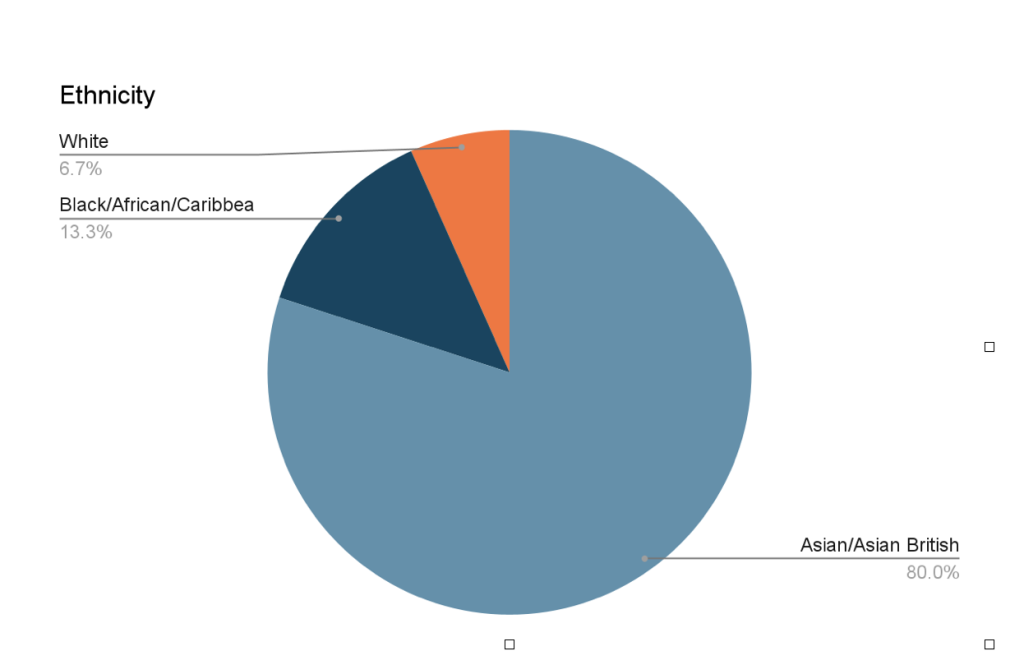
Q3, 4 & 5. All fifteen respondents identified as females also female assigned at birth and heteronormal
Q6. No disability
Q7. One respondent identified as a spiritual Healing and the remaining 14 stated as prefer not to say.
Part 2: Decolonising the curriculum
Q 8. This part of the questionnaire asked the respondents how familiar they were with the idea of decolonisation in the curriculum at the university followed by a definition of what decolonisation is.
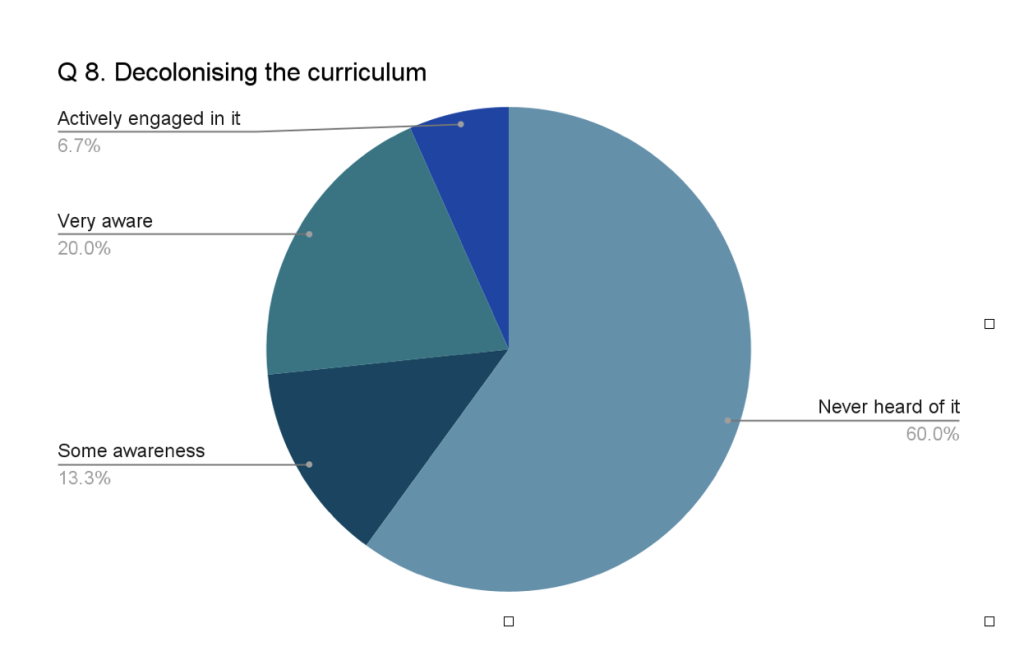
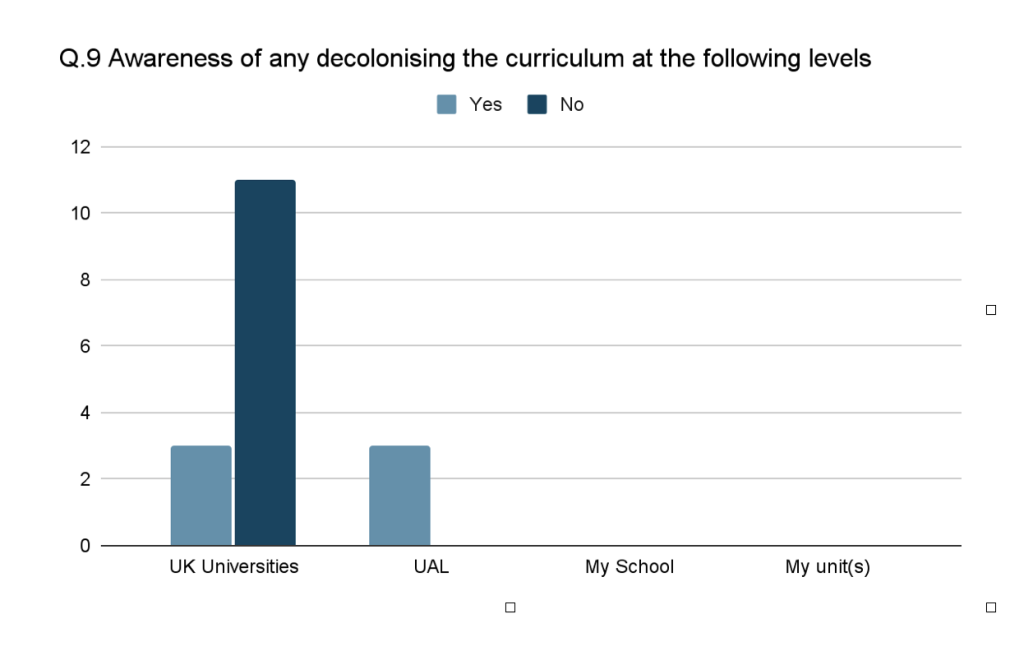
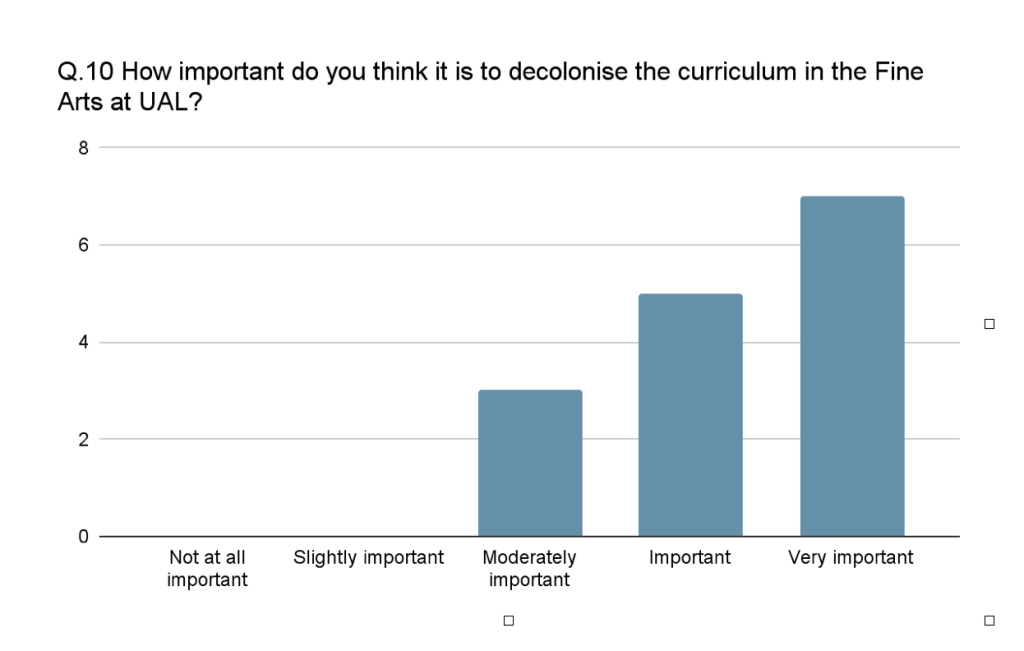
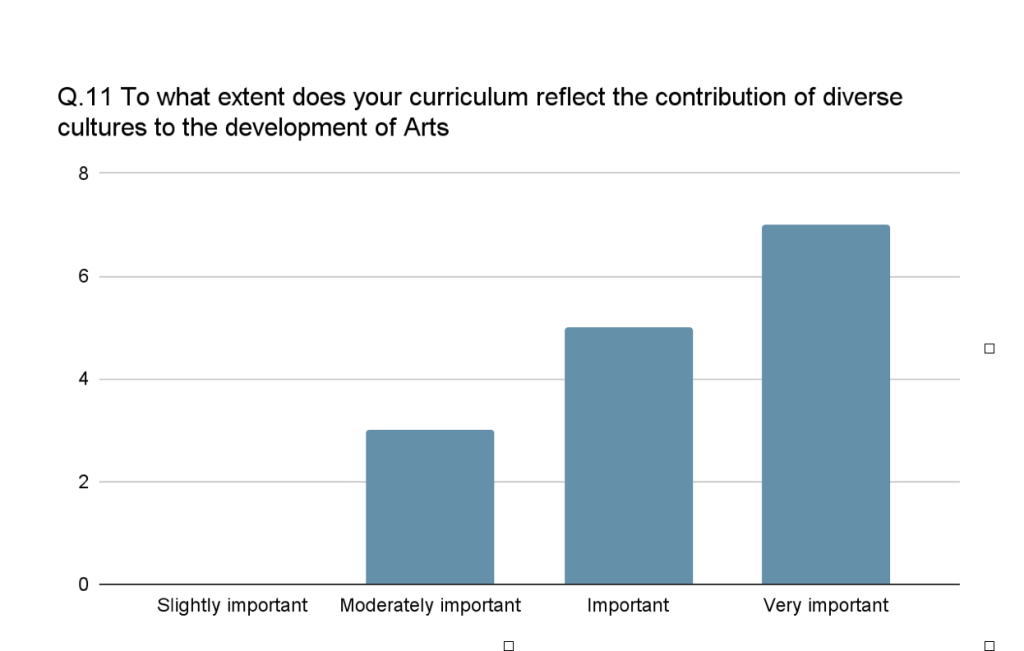
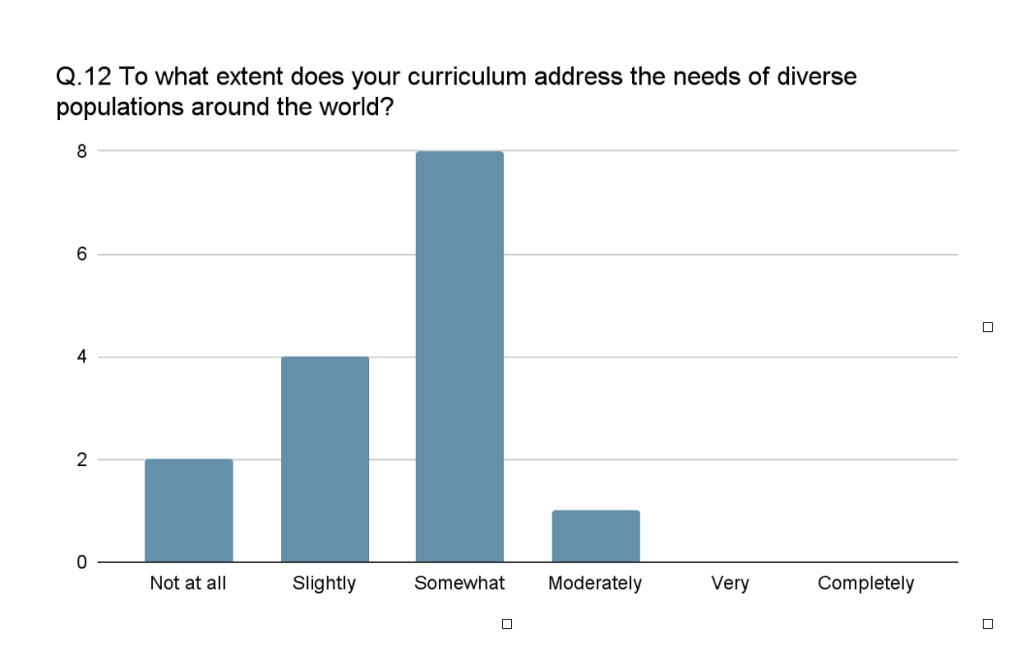
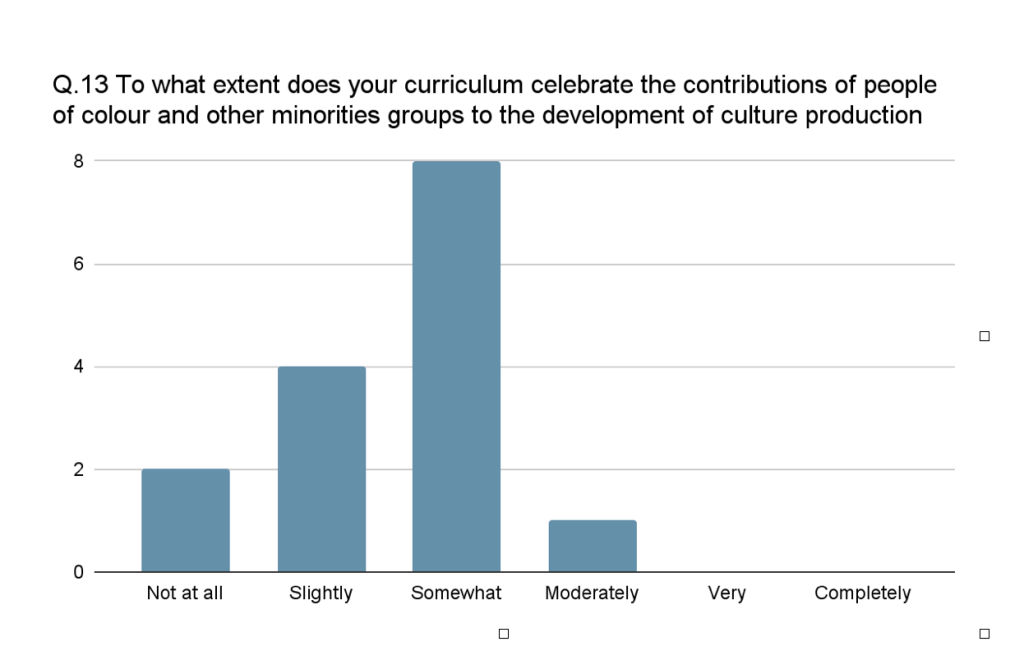
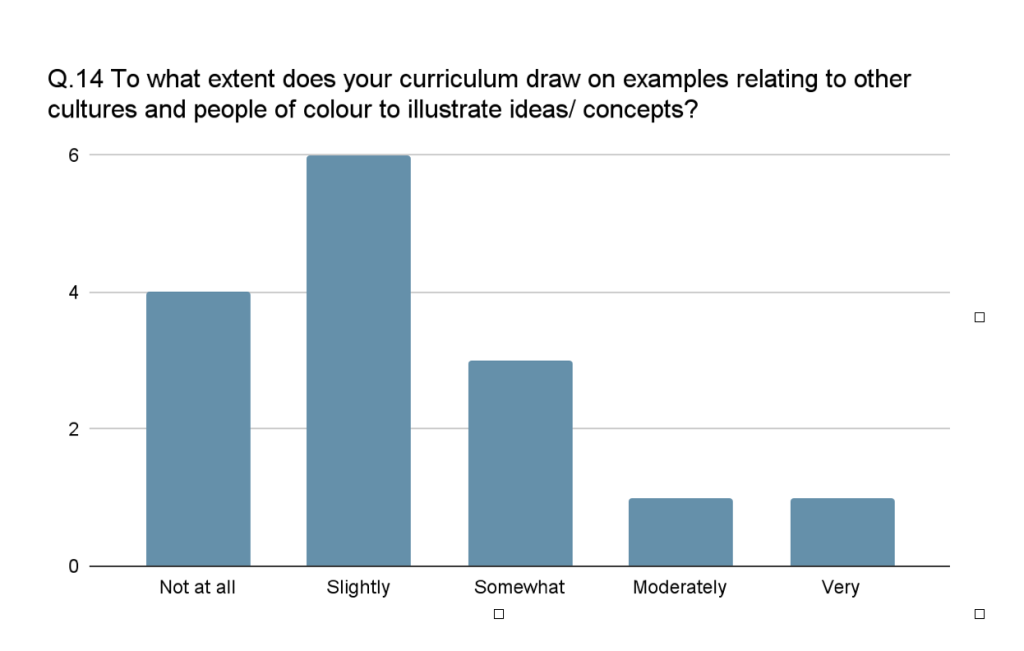
Q15. What three things would you expect to see in a decolonised curriculum? [Max 280 characters]
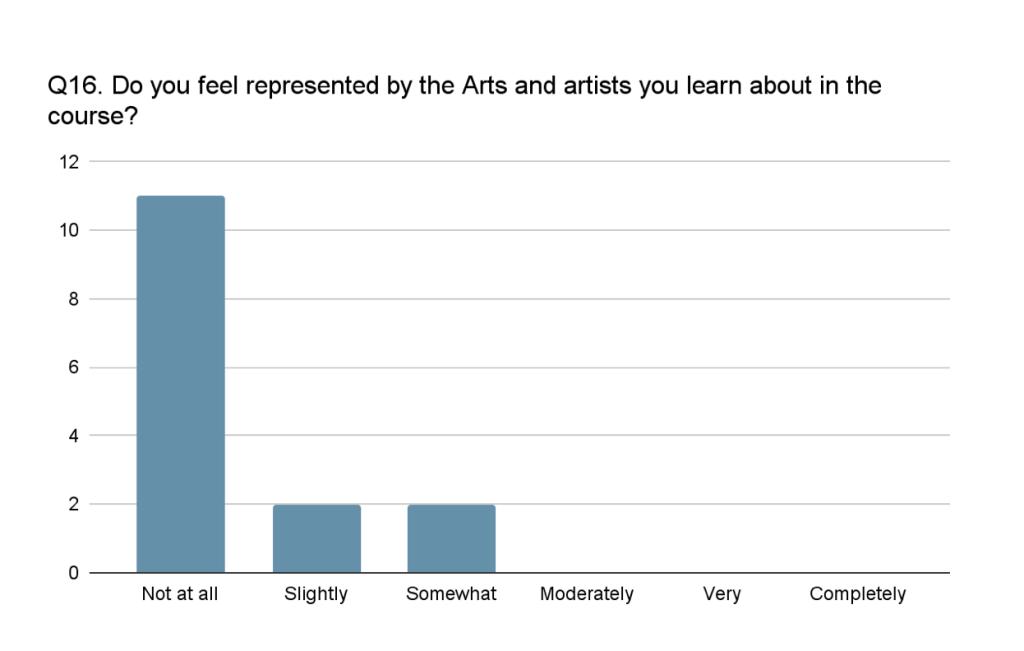
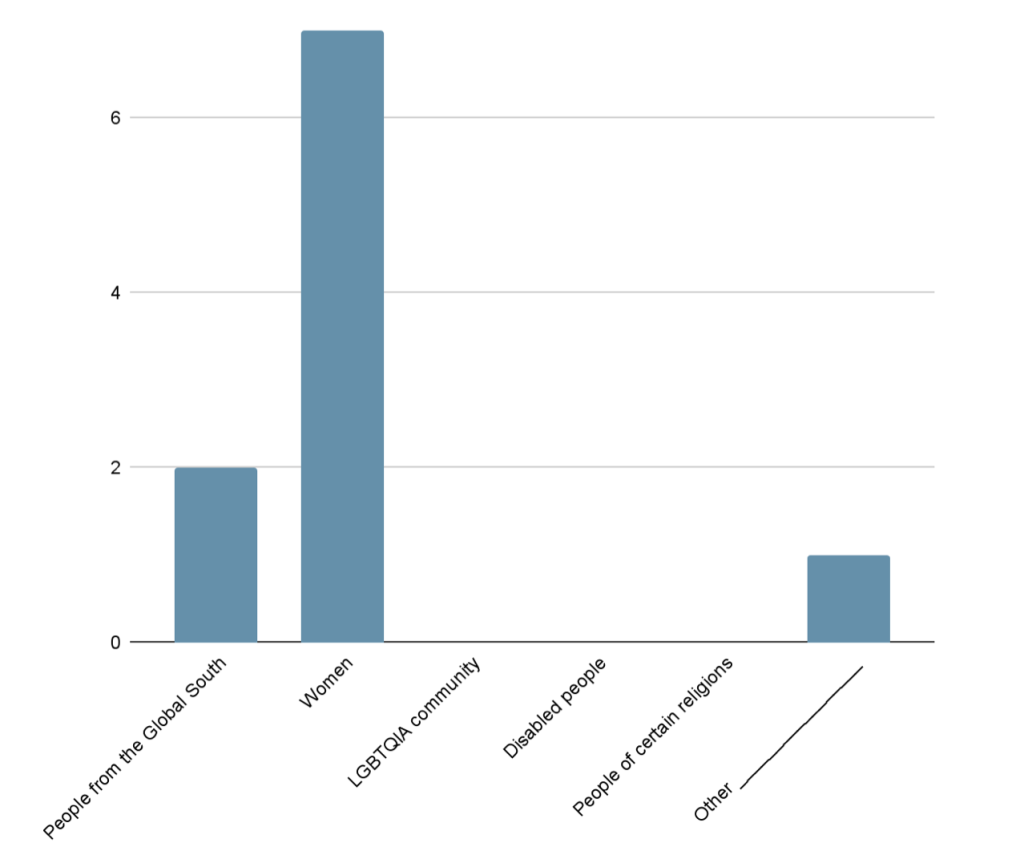
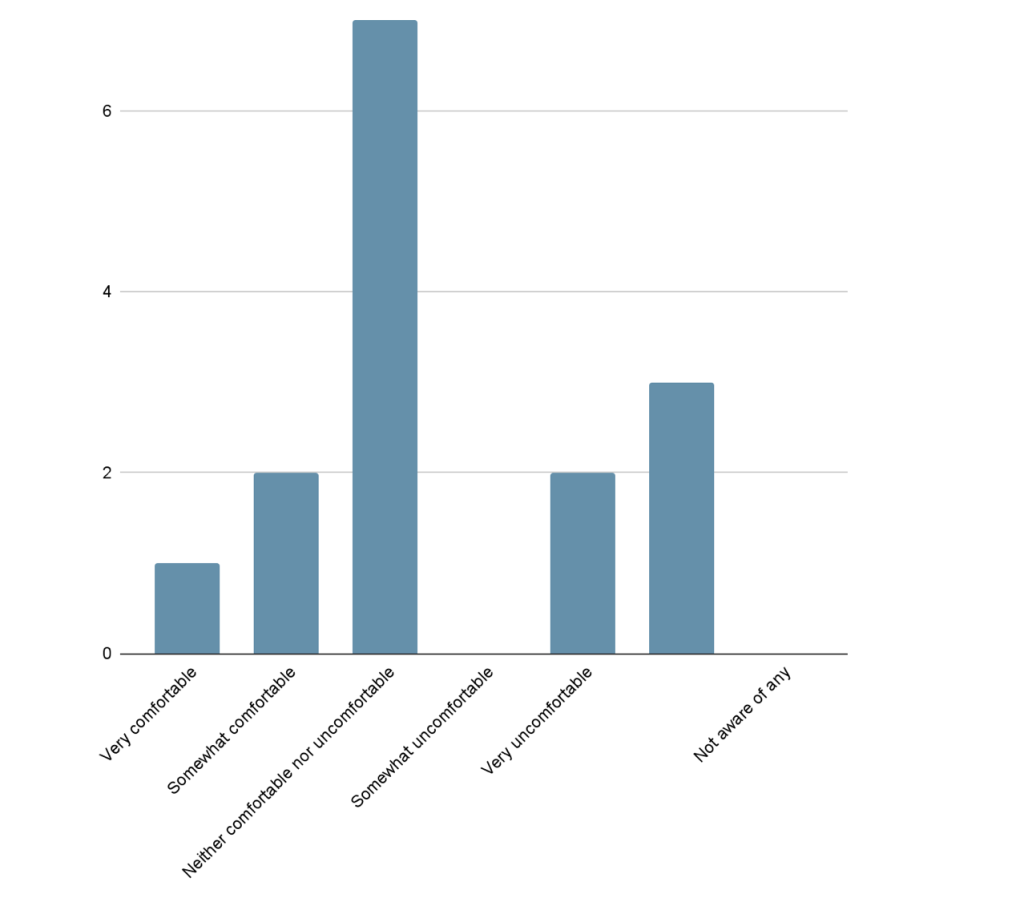
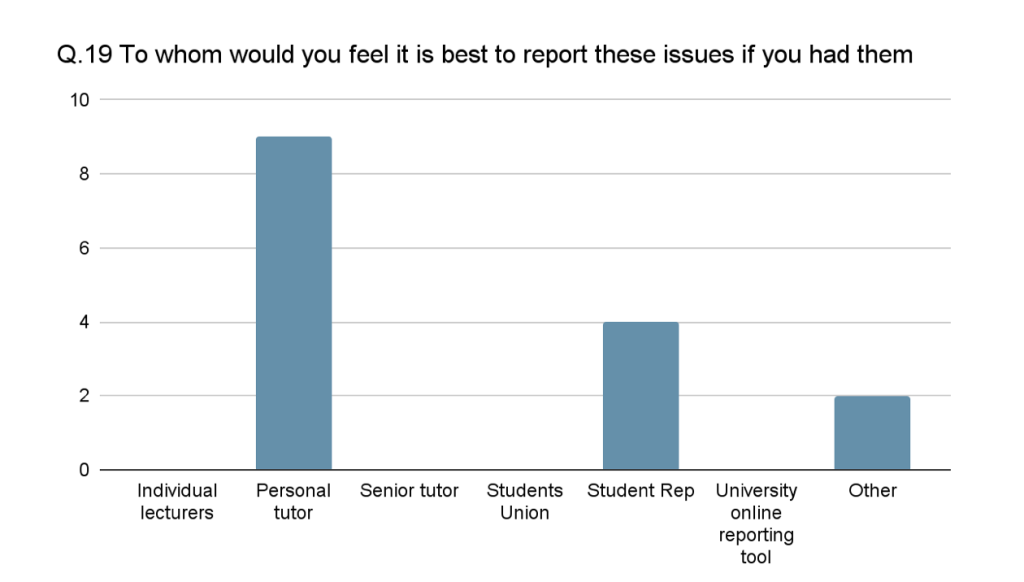
‘I am not sure, as we celebrated black history month last year and discussed different artists during our classes. More diversity in the material’
Part 3 – Equality, Diversity and Inclusion in the Fine Arts curriculum
Q21 Are there any specific units or topics in which you have experienced non-inclusive practice? Please explain your answer. Please do not name any individuals. If you wish to raise any concerns about unacceptable behaviour
No response
Q22. Have you come across any examples of good practice where inequalities have been highlighted and discussed within your course? Please explain them.
No response
Q23 Are there any ways a discussion about equality, diversity and inclusion in the Arts can be encouraged within your course? “
I think we cover a good array of topics in conversation”.
Part 4 – Final comments
Q24. Do you have any other comments relating to decolonising and diversifying the curriculum?
No response